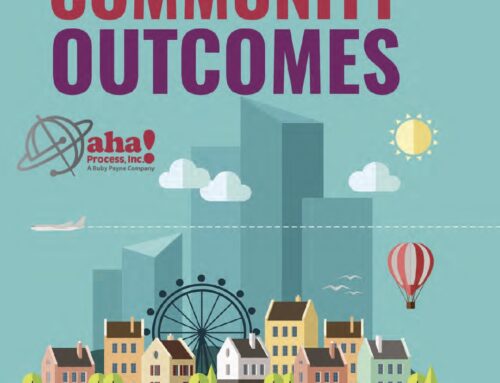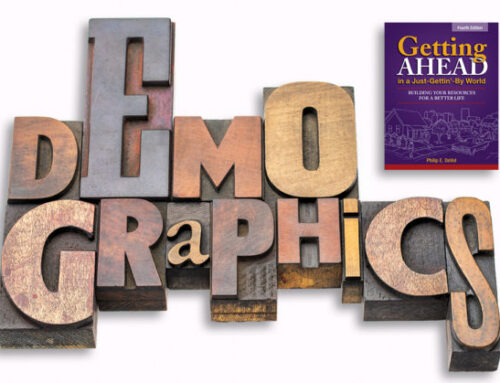 In 2016, when I accepted the position as director of Muskogee Bridges Out of Poverty, we were at the beginning of a five-year grant from a local foundation. The budget was already set for the next five years, which meant if we were to grow the program, we would have to seek outside funding. I came from a career in the chamber of commerce world, which brought with it relationships I had with several bankers in town. One day while I was having lunch with a local banker, she mentioned that her bank would love to donate some money to us because we were a 501(c)(3) that focused on the lower- to middle-income community. Of course, I was intrigued and inquired further. She explained the Community Reinvestment Act (CRA) and said that if her bank volunteers and donates to organizations that help those in poverty, their CRA rating will go up. It’s a win-win. I immediately went to work on an idea I had for creating a financial literacy class for Getting Ahead graduates. I had already identified the curriculum; I just needed funding. What a perfect opportunity.
In 2016, when I accepted the position as director of Muskogee Bridges Out of Poverty, we were at the beginning of a five-year grant from a local foundation. The budget was already set for the next five years, which meant if we were to grow the program, we would have to seek outside funding. I came from a career in the chamber of commerce world, which brought with it relationships I had with several bankers in town. One day while I was having lunch with a local banker, she mentioned that her bank would love to donate some money to us because we were a 501(c)(3) that focused on the lower- to middle-income community. Of course, I was intrigued and inquired further. She explained the Community Reinvestment Act (CRA) and said that if her bank volunteers and donates to organizations that help those in poverty, their CRA rating will go up. It’s a win-win. I immediately went to work on an idea I had for creating a financial literacy class for Getting Ahead graduates. I had already identified the curriculum; I just needed funding. What a perfect opportunity.
The Community Reinvestment Act was enacted by Congress in 1977 to encourage banks to help meet the needs of the communities where they operate, including low- and moderate-income neighborhoods. Under the CRA, insured banking institutions are evaluated periodically to assess their efforts to support their communities. The record is then used to evaluate applications for future branch openings, bank mergers, charters, and bank acquisitions. Before the CRA was enacted, few banks made loans to consumers with low or moderate incomes. Many banks redlined certain parts of cities and refused to lend to people and businesses in those areas. This left most inner cities and rural areas without access to capital to revitalize their neighborhoods. The CRA outlawed redlining.
Now banks can comply with the CRA and invest in their communities by:
- Funding economic development projects in underserved communities to rebuild neighborhoods, provide affordable housing, and remodel abandoned commercial buildings.
- Cashing payroll and government checks for people who don’t have traditional checking accounts.
- Providing free tax preparation for low- and moderate-income residents.
- Supporting employees’ volunteer efforts in the community.
- Donating money to nonprofit organizations within the community.
- Providing free workshops and financial education courses to community members.
Within a month we had secured $1,000 a year from six local banks for our Money Matters 101/Financial Peace University Staying Ahead class. These funds are used to buy supplies, meals, and childcare for these newly dubbed “investors”. We hold two classes a year in conjunction with our Getting Ahead classes, one beginning in January and one in August both in English and in Spanish.
Five years later we are sharing these results with our banking friends who also benefit from the financial efforts these families are making. Some have opened bank accounts, received vehicle loans, and are starting to invest. Here are some testimonials.
“I have learned how to start saving, how to have boundaries, and how to organize my debts and pay them off. We were around $30,000 in debt, and now I am around $2,500 in debt and our house and cars are paid off. We have an emergency fund and a savings account. We will be debt-free by the end of this year. We are working on our goal, which is to save to buy some land and a new house.”
–Blanca
“My money was in savings when the pandemic hit. Bills were caught up or had credits in the account. No credit card debt and car paid for. It was also easy to switch into ‘no spend’ mode since I was taught how to do it in Money Matters 101.”
–Brandyann
“I had 22 credit cards when I started Getting Ahead; now I have one. Now I tell my money what to do instead of asking where it went. I was eating at home, so there was no need to go out when COVID started. I also had a fully stocked kitchen, so I wasn’t affected by all the panic buying. I was able to help bail out some younger family members who were not so fortunate. Three years ago, that would not even be an option to consider. I tell many people that Bridges/Money Matters 101/Financial Peace University has changed my life, and I mean every word of it.”
–Keli
“I learned how to steer clear of financial predators and save. I now know my rights and how to ask questions. I paid off a $500 payday loan that I paid $60 a month on for five years ($3,600) after learning about financial predators in the Money Matters 101 class.”
–Trena
“Muskogee Bridges consistently produces life-changing outcomes for program participants, who are among the most vulnerable in the Muskogee area. Their resolve to break the cycle of poverty positively impacts generations of families within our community. We are proud to partner with them; they are the best of us.”
–Jason Hughes, president of Muskogee Bank of Oklahoma
This is what it looks like when a Bridges community comes together to solve problems. Everyone wins! Well, everyone except the payday loan and credit card companies. If you are searching for funding for your Getting Ahead classes, consider asking your local banks if you can speak to their CRA officer.








